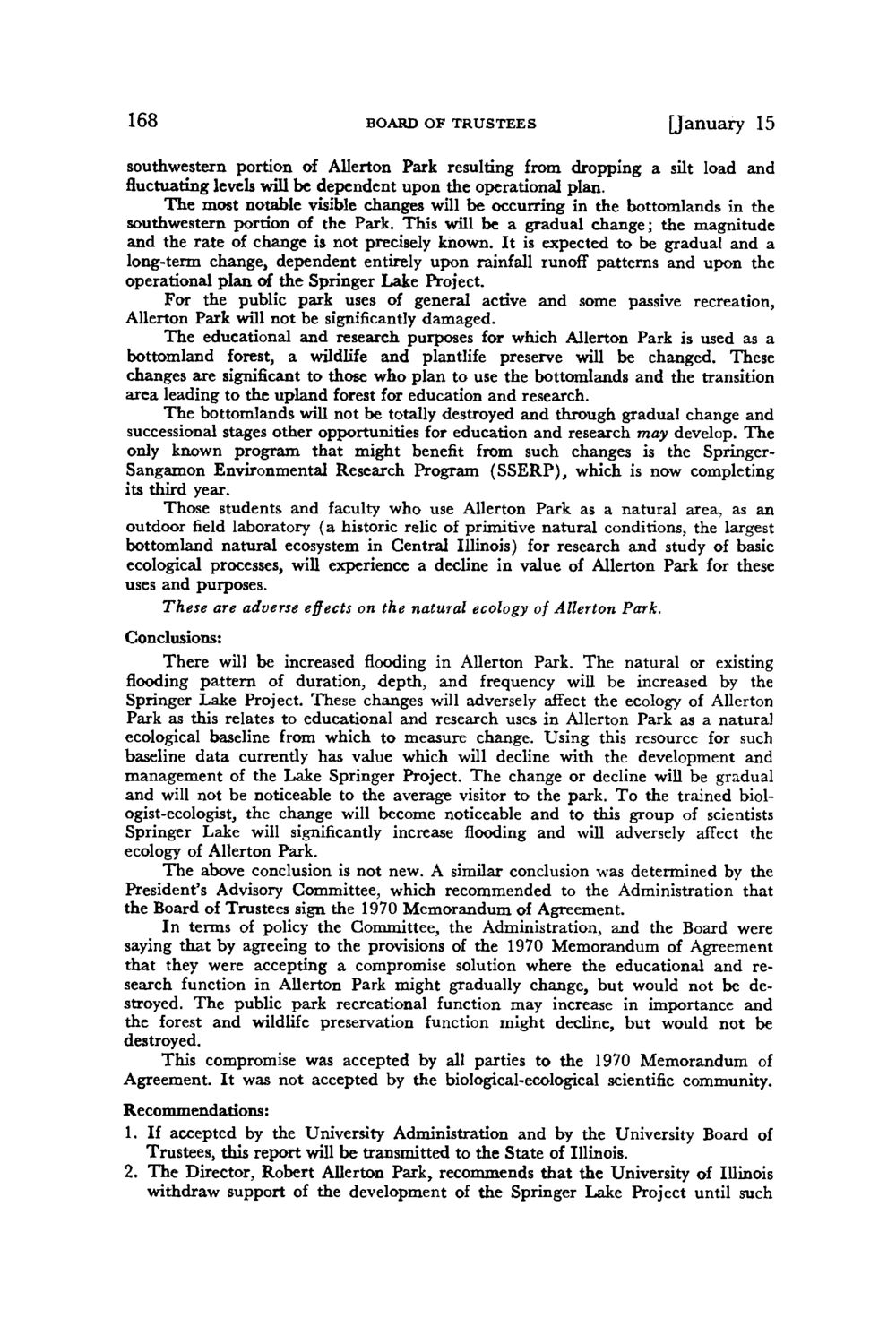| |
| |
Caption: Board of Trustees Minutes - 1976
This is a reduced-resolution page image for fast online browsing.

EXTRACTED TEXT FROM PAGE:
168 BOARD OF TRUSTEES (January 15 southwestern portion of AUerton Park resulting from dropping a silt load and fluctuating levels will be dependent upon the operational plan. T h e most notable visible changes will be occurring in the bottomlands in the southwestern portion of the Park. This will be a gradual change; the magnitude and the rate of change is not precisely known. It is expected to be gradual and a long-term change, dependent entirely upon rainfall runoff patterns and upon the operational plan of the Springer Lake Project. For the public park uses of general active and some passive recreation, AUerton Park will not be significantly damaged. The educational and research purposes for which AUerton Park is used as a bottomland forest, a wildlife and plantlife preserve will be changed. These changes are significant to those who plan to use the bottomlands and the transition area leading to the upland forest for education and research. T h e bottomlands will not be totally destroyed and through gradual change and successional stages other opportunities for education and research may develop. The only known program that might benefit from such changes is the SpringerSangamon Environmental Research Program (SSERP), which is now completing its third year. Those students and faculty who use AUerton Park as a natural area, as an outdoor field laboratory (a historic relic of primitive natural conditions, the largest bottomland natural ecosystem in Central Illinois) for research and study of basic ecological processes, will experience a decline in value of AUerton Park for these uses and purposes. These are adverse effects on the natural ecology of AUerton Park. Conclusions: There will be increased flooding in AUerton Park. The natural or existing flooding pattern of duration, depth, and frequency will be increased by the Springer Lake Project. These changes will adversely affect the ecology of AUerton Park as this relates to educational and research uses in AUerton Park as a natural ecological baseline from which to measure change. Using this resource for such baseline data currently has value which will decline with the development and management of the Lake Springer Project. T h e change or decline wiU be gradual and will not be noticeable to the average visitor to the park. T o the trained biologist-ecologist, the change will become noticeable and to this group of scientists Springer Lake will significantly increase flooding and will adversely affect the ecology of AUerton Park. T h e above conclusion is not new. A similar conclusion was determined by the President's Advisory Committee, which recommended to the Administration that the Board of Trustees sign the 1970 Memorandum of Agreement. In terms of policy the Committee, the Administration, and the Board were saying that by agreeing to the provisions of the 1970 Memorandum of Agreement that they were accepting a compromise solution where the educational and research function in AUerton Park might gradually change, but would not be destroyed. T h e public park recreational function may increase in importance and the forest and wildlife preservation function might decline, but would not be destroyed. This compromise was accepted by all parties to the 1970 Memorandum of Agreement. It was not accepted by the biological-ecological scientific community. Recommendations: 1. If accepted by the University Administration and by the University Board of Trustees, this report wiU be transmitted to the State of Illinois. 2. T h e Director, Robert AUerton Park, recommends that the University of IUinois withdraw support of the development of the Springer Lake Project until such
| |